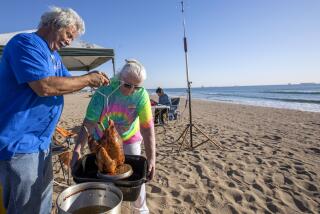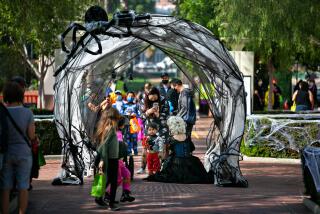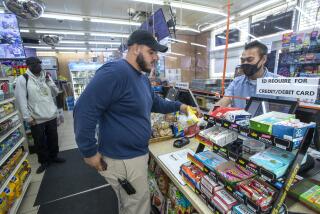Californians shouldn’t trick-or-treat this Halloween, state health officials say

State health officials recommend residents skip trick-or-treating this year but stop short of prohibiting the activity.
SACRAMENTO — State health officials are advising Californians to skip trick-or-treating this Halloween, though their new guidelines, released Tuesday, stop short of prohibiting the activity amid the COVID-19 pandemic.
The guidelines come as trick-or-treaters ready their costumes for Oct. 31, which this year falls on a Saturday, increasing the likelihood of gatherings.
Health officials voiced concerns that it’s not possible to practice social distancing while trick-or-treating and that Día de los Muertos and Halloween celebrations would lead to interaction with people from outside one’s household. State officials are strongly discouraging trick-or-treating and suggested that some Halloween activities, such as costume contests and pumpkin carving, move online. They recommended that families go on a walk while dressed up but forgo stopping door-to-door for candy.
“This is a recommendation,” California Health and Human Services Secretary Dr. Mark Ghaly said Tuesday. “Does that mean that trick-or-treaters will see some enforcement? Absolutely not. We don’t want to turn certainly what is a celebration and a time of joy into something that is difficult or contentious, but we also recognize the need to provide a clear understanding of the risks and why we recommend strongly that we do Halloween differently than we have in the past.”
The state on Friday released holiday guidelines prohibiting gatherings among more than three households and urging residents who choose to socialize with other families to do so with a consistent group in order to reduce the risk of transmission. The guidelines also note that interacting at multiple gatherings with different households or groups is “strongly discouraged.”
The state had previously warned residents against mingling with members of any other households, but those restrictions are likely to become even more difficult to abide by as people look to spend holidays such as Thanksgiving and Christmas together.
Ghaly said Tuesday that the state has to be realistic in its expectation that residents will want to gather during the holiday season and added that providing guidance on how to limit exposure in those cases is important.
“We want to carry through this difficult time for transmission with flu, colder weather, more potential for gatherings, and that we come out of it with continued reduced cases and that we don’t see that surge that other parts of the country are experiencing,” Ghaly said.
Last month, Los Angeles County public health officials prohibited trick-or-treating; following blowback, they revised the guidance a day later to say the activity was “not recommended.” All Halloween gatherings with people outside of a household, including haunted houses, will be barred in Los Angeles County, regardless of the state’s rules allowing gatherings of up to three households. Ghaly noted Tuesday that counties can implement guidelines that are more restrictive than those of the state, but not less restrictive.
California is experiencing a respite from COVID-19; hospitalizations and deaths have dropped to the lowest levels seen in months. In addition, the positivity rate, which measures the percentage of tests for the virus that come back positive, is at an all-time low of 2.7%, according to state data.
The declining numbers have allowed more counties to reopen businesses and loosen restrictions on restaurants, movie theaters and gyms.
But Gov. Gavin Newsom has warned residents to remain vigilant, emphasizing that the coronavirus, coupled with the upcoming flu season, could create challenges in the state.
“We are entering into the holidays, but also we’re entering into the part of the year when things cool down and people are more likely to congregate ... in settings that put their physical proximity and likelihood of transmitting disease at higher risk,” Newsom said Monday. “Don’t be misled that this disease is any less deadly. Quite the contrary — it is as deadly as it’s ever been in the context of those that are high-risk.”
More to Read
Sign up for Essential California
The most important California stories and recommendations in your inbox every morning.
You may occasionally receive promotional content from the Los Angeles Times.











